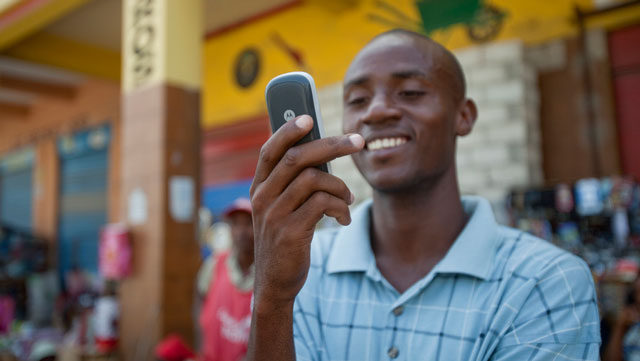 The worldwide debate about zero rating and network neutrality has brought the issue of affordable Internet access into sharp relief. I recently came back from the Internet Governance Forum (IGF) in Brazil, where there were no less than seven sessions on zero rating and neutrality. Facebook’s Internet.org, now renamed as Free Basics, continues to be a subject of often emotional debate as to whether it brings greater benefits or harms to those who use it.
The worldwide debate about zero rating and network neutrality has brought the issue of affordable Internet access into sharp relief. I recently came back from the Internet Governance Forum (IGF) in Brazil, where there were no less than seven sessions on zero rating and neutrality. Facebook’s Internet.org, now renamed as Free Basics, continues to be a subject of often emotional debate as to whether it brings greater benefits or harms to those who use it.
This has got me thinking about how we value the Internet and how fast the Internet needs to be in order to qualify as “enough”. In one of his sessions at the IGF, Internet pioneer Vint Cerf pointed out that we use the word “Internet” as if it means the same thing to everyone, but this isn’t really true. A feature-phone user browsing the Internet via Opera over a 3G connection does not have the same experience as the San Francisco-based developer on gigabit fibre staring at dual 26-inch monitors.
The “all bits are created equal” debate in network neutrality doesn’t really take into account our varied experiences of the Internet. On a personal level, it is clear that some bits are more valuable to us than others. A one or a zero that indicates whether your loved one is alive is worth infinitely more than 4GB of the latest Hollywood movie.
This leads me to question the assumption, implicit in most national broadband strategies, that the value of Internet access increases more or less proportionately with increase in speed. The reality is that even very tiny amounts of data can be enormously valuable and that the value of access goes up dramatically with even a little access and then tapers off.
From a value maximisation perspective then one might conclude that it is more strategic to make a priority of ensuring that everyone has at least some connectivity as opposed to some percentage of the people getting fast Internet.
This got me thinking about the spread of mobile telephony in sub-Saharan Africa. The pay-as-you-go model implemented by mobile network operators means it doesn’t cost any money to be part of the network. All phones with a Sim card automatically register on the network and are callable on the network. A credit is not required. Why has this turned out to be a such a phenomenally successful model? Because operators recognised that each and every person connected to the network added value to the network whether they made a call or not because they increased the size of the callable network, thereby increasing value to paying users. This phenomenon is known as network effect and while it may have been a somewhat esoteric concept 20 years ago when the mobile industry started, it is now well understood by any Internet entrepreneur.
Registering and managing non-paying customers on the phone network is a significant operational and financial overhead for mobile operators, especially now with mandatory Sim registration being more common. Connecting phones to the network for free has obviously proven to be worthwhile. The increase in size of the overall network also helps to transform those non-paying users into paying ones as they see more and more value from the increased number of people to connect to. It is a positive cycle.
This brings me back to an approach I suggested last year: low-bitrate, generic zero-rating. What if it were normal for all operators to offer low-bitrate, generic Internet access in the same manner that all operators connect phones to their network? Let’s imagine that Internet data were enabled by default for free at GSM (2G) speeds of only 9,6kbit/s to all users. Let’s also imagine that it is a best-effort service that might not always achieve that speed or may have terrible latency, a bit like real 2G service.
Generic low-speed zero-rating of mobile networks could have multiple impacts.
A million users consuming 2G at a modest 4,8kbit/s would consume about 4,8Gbit/s per second of capacity. Looking at the adult population of South Africa of roughly 35m people, if everyone were consuming that data on their phones at one time, it would amount to 168Gbit/s of capacity across the entire country. Let’s put this in the context of South Africa’s undersea fibre-optic cable capacity, which currently has an aggregate design capacity of 17Tbit/s, soon to reach 22Tbit/s when the Ace cable lands. Free 2G data for all would consume less than 0,01% of the design capacity of the international submarine cables landing in South Africa.

That is a very rough and inevitably flawed calculation. It doesn’t take into account whether the existing mobile networks could handle this capacity with their current spectrum allocations and technology. It also doesn’t take into account backhaul limitations where terrestrial fibre is not available. But we do know that mobile operators are actively investing in upgrading their networks, which would make this amount of data an increasingly small percentage of their network traffic. But the value to individuals would not diminish. Generic low-speed zero-rating of mobile networks could have multiple impacts. It would:
Spur adoption of data services. As Clay Shirky has so eloquently put it: “If things are expensive to try, people will hold back from trying them and they’ll spend all their time trying not to fail. If the cost of experimentation falls though, and I mean falls precipitously, then people will spend a lot of time experimenting, and instead of not failing, the goal becomes to fail informatively to learn something from the things you tried.”
Legitimise data as a means of government/civic communication. If everyone can access basic data services just by having a feature/smartphone, then it is easier to justify government investment in e-services.
Decrease the digital divide. Democratising access to data through free low-bitrate access would create a true on-ramp to the Internet and its vast diversity of services and interactions.
Open up vast new markets to data service providers. The network-effects of millions of new data users would dramatically increase the value of data services in general.
Spur innovation in low-data consumption applications. If you know that you can reach everyone at a very low speed, it would spur both the public and private sector to develop applications that consume less bandwidth in order to reach more people. Indeed, Facebook is already doing this with their application development.
Imagine a world where all phones were automatically connected to the Internet, at no charge.
I’ve asked you to imagine a world where mobile phones connect to the Internet in the same way that they simply connect to the mobile phone network, where there are no data charges for very low data speeds. On the surface at least it would seem that the benefits to both the public and private sector would dramatically outweigh the costs of doing this. If we accept that the value of access is not directly proportional to speed of access and that there is huge value in even small amounts of data access, then perhaps a national strategy ought to focus on getting everyone connected at a modest, free rate as opposed to say 80% of the people at, say, 2Mbit/s?
It will take more detailed cost modelling to really dig into this idea, but I cannot help but think of more consumer benefits at every turn. Even for globe-trotting travellers. Imagine being able to pick up basic text messages and e-mails as soon as you get off the plane in a new country without having to search for a Wi-Fi hotspot or wonder whether you dare turn on roaming. Always-on mobile data could open up new possibilities for mobile payment services.
Some operators, like T-Mobile in the US, already offer 2G roaming but only for post-paid customers. What if it just made good social and economic sense to have basic rate Internet enabled for all mobile phones?
- This article was made possible in part through support from the Network Startup Resource Center
- This piece was originally published on Song’s blog, Many Possibilities. Song is founder of Village Telco

